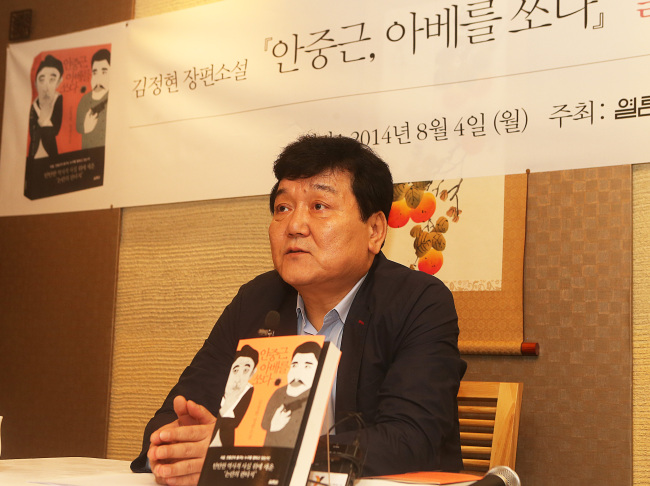With Japanese Prime Minister Shinzo Abe pushing agendas of nationalism and historical revisionism, Japan and South Korea’s ties are at their lowest ebb in decades with no immediate signs of a thaw.
Kim Jung-hyun, author of the 1996 bestseller “The Father” that sold over 2 million copies, wrote a new historical fantasy, “Ahn Jung-geun Shot Abe,” in hopes of getting a strong message across to Japan.
“I did not write this novel to warn Abe, but to give him a chance to examine himself and feel some kind of remorse over Japan’s past behavior,” the author said in a press release for the book on Monday.
“Japan has not offered deep remorse or heart-felt apologies over their wartime crimes. Instead, they still visit places like Yasukuni Shrine, paying homage to class-A war criminals, shamelessly and arrogantly.”
 |
Korean novelist Kim Jung-hyun talks about his new novel “Ahn Jung-geun Shot Abe” during a press conference in Seoul on Monday. (Yonhap) |
The book is based on the tale of Ahn Jung-geun (1879-1910), a Korean patriot who assassinated Hirobumi Ito, the first resident governor-general of Japanese-occupied Korea on Oct. 26, 1909. Kim brings the incident to the current era and restructures the story, where a reincarnated Ahn assassinates Abe on the same day, at the same place, in the same method as he did Ito about 100 years earlier.
Kim shuttled between China and Korea for three years to conduct laborious research on Ahn. He referred to Ahn’s biography and trial records to vividly illustrate his circumstances and vision.
While Ahn Jung-geun has been explored in a number of books, detailed accounts of his trial have not yet been told, Kim says.
“That’s why I wanted to focus on the trial. The trial illustrates his unshaken creed and aspiration that made him fearless and dignified even as interrogations went on. Ahn had to face 11 interrogations in two months, immediately followed by prosecution and a death sentence.”
The book dedicates the first two of its three sections to Ahn and Ito, while the last section deals with Ahn and Abe.
“The trial was unjust and illegal,” said Kim. “During the time, Harbin, where the shooting occurred, fell under Russian jurisdiction. But the Japanese persisted to take Ahn under their jurisdiction, claiming their legitimacy through the Eulsa Treaty.” The Eulsa Treaty, also known as the Japan-Korea Treaty of 1905, was a coerced treaty which deprived Korea of diplomatic sovereignty.
“The Japanese wanted to label this incident (Ahn’s assassination of Ito) an act of terrorism, not a patriotic deed.”
After the exhaustive return to the past, Ahn later faces Abe, a hundred years later, on a train to Harbin. Ahn tells Abe of Japan’s detailed charges of 15 articles, including wartime sexual slavery, Japanese textbooks distorting history, and the territorial dispute over Dokdo.
“An act of forgiveness and compensation shall continue until the victim allows the perpetrator to stop apologizing,” Ahn angrily cried out to Abe in the book. “But, what was on your mind when you visited to pay tribute to the perpetrators of the crimes?”
Abe replies, “It is none of my business, I didn’t commit the crime.”
It is at this moment when Ahn realizes that Abe will never feel guilty or remorseful. He had no choice but to kill him.
The author dealt with the sensitive and controversial subject of assassinating the current prime minister in the format of fiction.
“It is true that he has not apologized, so he is responsible if he is offended or feels unpleasant if he ever reads the novel,” said Kim in response.
Kim initially planned to publish the book around Oct. 26, on the day when Ahn shot Ito, but pushed up the publishing to mark the Independence Day of Korea, which falls on Aug. 15.
“I was really careful in writing a novel about such a respected figure,” said Kim. “I hope this book will serve as a chance for people to understand who Ahn really was. He was an ordinary person before becoming a hero.”
By Ahn Sung-mi (
sahn@heraldcorp.com)








